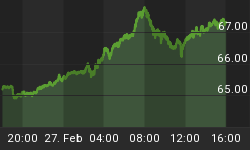After being bullish on equities for most of 2013, back on July 16th I warned that the U.S. stock market was due for a significant correction. Allow me to briefly expound on why another 10% selloff in the averages is highly likely from now until the end of October.
It was announced recently that the nation of Japan has finally produced the highest annualized rate of inflation that it has seen in the last five years (.7%). Therefore, it makes no sense that their 10-Year Note now offers the same yield as their inflation rate--especially given the fact that their government wants inflation to increase significantly from current levels.
No sane investor would loan money to a regime that has promised, and is delivering, a higher rate of inflation than what can be garnered from owning its debt going out ten years. This means the only buyer of JGBs at the current rate will be the BOJ (Bank of Japan). The sad truth is that Japan is very close to experiencing extreme chaos in its bond market and economy. This chaos will send shock waves throughout the globe. Investors should take heed.
Adding to the downward pressure coming from Japan is the chaos happening in emerging markets. Many of these formerly booming economies have recently suffered falling growth rates, equity market debacles, and currency collapses, which have gone virtually unnoticed by most of the developed world up to this point.
For example, the talk of Fed tapering its bond purchases has helped send the Rupee down 20% verse the USD; and the BSE (Bombay Stock Exchange) SENSEX down 10% in the last three months. Other countries such as Thailand, Turkey, Brazil, Indonesia, and the Philippines (just to name a few), have suffered the same fate or even worse. The U.S. markets cannot continue to ignore the carnage taking place in the emerging world for much longer.
Despite the recent move towards a peaceful resolution to the crisis in Syria, oil prices remain well above a hundred dollars a barrel. Consumers are already suffering from falling real incomes and a job market that mostly offers part-time work. Stubbornly high oil prices will crimp consumer spending and hurt GDP growth. Unless oil prices drop significantly in the near future, it would be improbable to expect corporations to meet earnings expectations under this scenario. Look for earnings and multiple contractions to be the result if oil prices remain elevated.
Political gridlock in Washington D.C. has to be resolved within the next 60 days. The debt ceiling must be raised and government agencies need to have funding authorized through a Continuing Resolution by mid-October, or the U.S. government will be effectively shut down. The last time this situation arose was the summer of 2011. During that time, the Dow Jones shed 2,000 points in just 30 days. It would be prudent to anticipate a similar result from another round of government gridlock.
Finally, the Fed still believes the size of its balance sheet determines interest rate levels. Therefore, it may start to gradually bring down the level of its monthly asset purchases toward zero beginning next month. However, the mere threat of tapering bond purchases has already caused long-term rates to spike over 100 basis points. The Fed doesn't believe tapering is tightening but the free market disagrees.
The 10-Year, which is now yielding 2.8%, has already contributed to causing business spending and home sales to fall. Durable goods dropped 7.3%, and capital spending fell 3.3% in July, while new home sales plunged 13.4% in the same month. A significant reduction in the Fed's asset purchases will send the benchmark 10-Year Note towards 4%, which should cause the economy to fall back into recession.
Investors must realize that any one of the factors listed above could send this over-valued stock market much lower and the odds are low that they all will be resolved innocuously. Nevertheless, Wall Street continues to promote the fantasy of a second-half economic rebound, and is currently pounding the table on stocks. In sharp contrast, I recommend going mostly into cash and owning physical gold and silver as insurance against the imminent turmoil and chaos which could take place in global markets in the near future.
Michael Pento is the President and Founder of Pento Portfolio Strategies and Author of the book "The Coming Bond Market Collapse."















